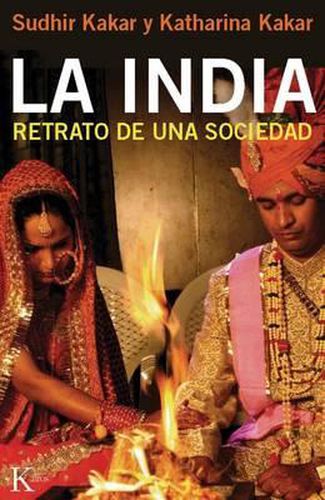Readings Newsletter
Become a Readings Member to make your shopping experience even easier.
Sign in or sign up for free!
You’re not far away from qualifying for FREE standard shipping within Australia
You’ve qualified for FREE standard shipping within Australia
The cart is loading…






In this bold, enlightening, and readable study, psychoanalyst Sudhir Kakar and anthropologist Katharina Kakar investigate the nature of Indian-ness, that sense of unity that underlies modern India s tremendous diversity, beyond ethnic or social differences. Focusing on what constitutes a common Indian identity, the authors examine in detail the complex hierarchical organization of Indian social life, based on the caste system; strong familial ties, founded upon the concept of extended family; the ayurvedic influence on health and body image; the modest attitude toward sex and marriage; the role of women in society; and the concept of the other, especially as it applies to Hindu-Muslim relations. Drawing upon three decades of research and sources as varied as the Mahabharata, the Kama Sutra, the writings of Gandhi, Bollywood movies, and popular folklore, the Kakars have created here a rich and colorful portrait of Indian society.
En este solido, esclarecedor y ameno estudio, el psicoanalista Sudhir Kakar y la antropologa Katharina Kakar investigan la naturaleza de la indianidad, esa unidad que subyace en la gran diversidad de la India moderna, mas alla de las diferencias etnicas o sociales. Centrandose en lo que constituye una comun identidad india, los autores examinen en detalle el complejo mundo jerarquico de las relaciones sociales indias, basado en la institucion de la casta; la particular concepcion de los vinculos familiares, derivada de la idea de familia extensa; la influencia del ayurveda en la imagen del cuerpo humano y la salud; la pudorosa actitud hacia el sexo y el matrimonio; el papel de la mujer en la sociedad; y la percepcion del otro, con especial enfasis en el conflicto hindu-musulman. Apoyados en tres decadas de investigacion y fuentes tan variadas como el Mahabharata, el Kamasutra, los escritos de Gandhi, las peliculas de Bollywood y el folclore popular, los Kakar han creado con esta obra un riquisimo y cromatico retrato de la sociedad india.
$9.00 standard shipping within Australia
FREE standard shipping within Australia for orders over $100.00
Express & International shipping calculated at checkout
In this bold, enlightening, and readable study, psychoanalyst Sudhir Kakar and anthropologist Katharina Kakar investigate the nature of Indian-ness, that sense of unity that underlies modern India s tremendous diversity, beyond ethnic or social differences. Focusing on what constitutes a common Indian identity, the authors examine in detail the complex hierarchical organization of Indian social life, based on the caste system; strong familial ties, founded upon the concept of extended family; the ayurvedic influence on health and body image; the modest attitude toward sex and marriage; the role of women in society; and the concept of the other, especially as it applies to Hindu-Muslim relations. Drawing upon three decades of research and sources as varied as the Mahabharata, the Kama Sutra, the writings of Gandhi, Bollywood movies, and popular folklore, the Kakars have created here a rich and colorful portrait of Indian society.
En este solido, esclarecedor y ameno estudio, el psicoanalista Sudhir Kakar y la antropologa Katharina Kakar investigan la naturaleza de la indianidad, esa unidad que subyace en la gran diversidad de la India moderna, mas alla de las diferencias etnicas o sociales. Centrandose en lo que constituye una comun identidad india, los autores examinen en detalle el complejo mundo jerarquico de las relaciones sociales indias, basado en la institucion de la casta; la particular concepcion de los vinculos familiares, derivada de la idea de familia extensa; la influencia del ayurveda en la imagen del cuerpo humano y la salud; la pudorosa actitud hacia el sexo y el matrimonio; el papel de la mujer en la sociedad; y la percepcion del otro, con especial enfasis en el conflicto hindu-musulman. Apoyados en tres decadas de investigacion y fuentes tan variadas como el Mahabharata, el Kamasutra, los escritos de Gandhi, las peliculas de Bollywood y el folclore popular, los Kakar han creado con esta obra un riquisimo y cromatico retrato de la sociedad india.